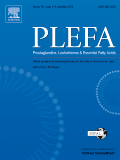
PROSTAGLANDINS LEUKOTRIENES AND ESSENTIAL FATTY ACIDS
Scope & Guideline
Illuminating Pathways of Health through Lipid Research
Introduction
Aims and Scopes
- Research on Fatty Acids and Health Outcomes:
The journal extensively covers the impact of various fatty acids, especially omega-3 and omega-6 polyunsaturated fatty acids (PUFAs), on health outcomes ranging from metabolic disorders to neurodevelopmental issues. - Mechanisms of Lipid Mediators:
It explores the biochemical pathways and mechanisms through which lipid mediators like prostaglandins and resolvins influence inflammatory responses and tissue repair. - Clinical Trials and Meta-Analyses:
The journal publishes results from clinical trials and systematic reviews that assess the efficacy of fatty acid interventions in various populations, providing evidence-based insights into dietary recommendations. - Biomarkers of Disease:
Research articles often investigate the association between fatty acid levels and biomarkers for diseases such as cardiovascular disease, diabetes, and inflammatory conditions, linking dietary fats to clinical outcomes. - Innovative Methodologies:
Methodological advancements in lipidomics and the analysis of fatty acid profiles in biological samples are frequently discussed, showcasing the journal's commitment to enhancing research techniques in this field.
Trending and Emerging
- Pro-resolving Lipid Mediators:
There is an increasing focus on pro-resolving lipid mediators such as resolvins and protectins, which play crucial roles in the resolution of inflammation and tissue repair, indicating a shift towards understanding inflammation management. - Impact of Omega-3 Fatty Acids on Mental Health:
Recent publications emphasize the effects of omega-3 fatty acids on mental health conditions, including anxiety and depression, showcasing a growing interest in the connection between diet and psychological well-being. - Fatty Acids and Pregnancy Outcomes:
Research on the implications of fatty acid intake during pregnancy and its effects on maternal and fetal health is emerging as a significant theme, reflecting a broader interest in nutrition during critical developmental periods. - Lipidomics and Personalized Nutrition:
The use of lipidomic profiling to personalize dietary recommendations and understand individual responses to fatty acid intake is gaining momentum, indicating a trend towards precision nutrition. - Fatty Acids in Chronic Disease Management:
There is an increasing number of studies linking fatty acid profiles to chronic diseases, suggesting a trend towards utilizing fatty acids as biomarkers for disease risk and management.
Declining or Waning
- Traditional Dietary Fats:
There is a noticeable decline in studies focusing solely on traditional dietary fats (like saturated fats) without considering their interaction with polyunsaturated fatty acids, suggesting a shift towards a more nuanced understanding of dietary fats. - Single-Component Studies:
Research concentrating on single fatty acids in isolation appears to be waning, as there is a growing trend towards examining the effects of entire dietary patterns or complex lipid profiles instead. - Animal Models in Early Research:
While animal model studies were previously prevalent, there is a noticeable decrease in their representation in favor of human clinical trials and epidemiological studies, indicating a shift towards more clinically relevant research.
Similar Journals

Annals of Hepatology
Advancing liver research, one article at a time.Annals of Hepatology is an esteemed open-access journal dedicated to the dynamic field of liver research and hepatology. Published by Elsevier España since 2002, this journal has established itself as a pivotal resource for researchers and clinicians alike, boasting a remarkable impact in the medical community with its 2023 rankings placing it in the Q2 quartile for Hepatology and Q1 quartile in Medicine (Miscellaneous). With an impressive Scopus rank of #20 out of 82 in the field of Hepatology and a notable 76th percentile standing, the journal is committed to disseminating high-quality, peer-reviewed articles that advance the understanding of liver diseases and their management. The editorial scope encompasses a broad range of topics, including liver pathology, therapeutic interventions, and public health implications related to hepatic disorders. Researchers, healthcare professionals, and students interested in the latest advancements in hepatology will find Annals of Hepatology an invaluable platform for sharing and accessing knowledge, with the convenience of open access enhancing global visibility and collaboration in this critical field of medicine.

Hepatology Communications
Transforming liver research into impactful care.Hepatology Communications, published by Lippincott Williams & Wilkins, serves as a pioneering platform in the field of hepatology, dedicated to advancing the understanding of liver diseases and treatments. Since its inception in 2017, this open access journal has rapidly gained recognition, achieving an impressive Q1 ranking in Hepatology as of 2023, and appealing to a diverse audience of researchers, clinicians, and students alike. With its focus on high-quality research and clinical studies, the journal aims to facilitate impactful discussions and disseminate vital findings that address the challenges faced in liver health. Operating out of the United States, and accessible globally, Hepatology Communications is committed to fostering a collaborative research environment and enhancing the visibility of scholarly work in hepatology, ultimately driving forward innovations in patient care and treatment strategies.

OCL-Oilseeds and Fats Crops and Lipids
Cultivating Knowledge for a Sustainable FutureOCL-Oilseeds and Fats Crops and Lipids is a renowned open-access journal published by EDP Sciences S A, specializing in the fields of agronomy, food science, and biochemistry. Since its inception in 2000, this journal has vigorously contributed to the advancement of research surrounding oilseeds and fats, addressing critical issues related to crop production, lipid analysis, and sustainable practices in food science. With an impressive impact factor reflected in its 2023 rankings—Q2 in Agronomy and Crop Science, Q3 in Biochemistry, and Q2 in Food Science—OCL stands out for its rigorous peer-review process and commitment to disseminating high-quality research. Its Scopus rankings further establish its reputation within the scientific community, occupying the 73rd and 64th percentiles in Agronomy and Food Science, respectively. This makes it an essential platform for researchers, professionals, and students focused on enhancing the understanding and application of lipid science and oilseed cultivation. Located in France, OCL encourages a global dialogue on innovations and discoveries that can drive the future of agricultural production and food technology.
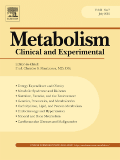
METABOLISM-CLINICAL AND EXPERIMENTAL
Elevating Knowledge in Biochemistry and MetabolismMETABOLISM-CLINICAL AND EXPERIMENTAL is a premier academic journal published by W B SAUNDERS CO-ELSEVIER INC, with a distinguished history dating back to 1952. This journal serves as a vital repository of knowledge in the fields of Endocrinology, Diabetes, and Metabolism, consistently ranking in the top quartile (Q1) within these categories according to the latest metrics. With an impressive impact factor and recognized for its contributions to Biochemistry, Genetics, and Molecular Biology, it ranks #5 out of 128 in the Scopus database for Endocrinology and #11 out of 244 for Medicine related to Endocrinology, Diabetes, and Metabolism, placing it in the 95th and 96th percentiles, respectively. While the journal does not currently offer open access, it maintains rigorous peer review standards and publishes cutting-edge research that drives forward the understanding of metabolic diseases and clinical practices. By engaging with METABOLISM-CLINICAL AND EXPERIMENTAL, researchers, healthcare professionals, and students can explore groundbreaking advancements and pivotal findings that shape the future of metabolic health.
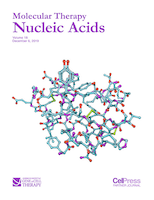
Molecular Therapy Nucleic Acids
Transforming research into breakthroughs in gene therapy.Molecular Therapy Nucleic Acids is a premier open-access journal published by CELL PRESS, dedicated to advancing the field of molecular medicine through the innovative application of nucleic acid-based therapies. Since its inception in 2012, this journal has become an essential resource for researchers and professionals in drug discovery and molecular medicine, reflected in its status as a Q1 journal in both categories for 2023. With a notable impact factor and high rankings in Scopus, including #8 out of 157 in Drug Discovery and #16 out of 178 in Molecular Medicine, it serves to disseminate groundbreaking research and foster collaborations among scientists worldwide. The journal's comprehensive scope encompasses a wide variety of topics, including gene therapy, RNA interference, and CRISPR technology, ensuring that it remains at the forefront of scientific excellence. With open access availability, Molecular Therapy Nucleic Acids actively promotes the widespread dissemination of knowledge, making its crucial insights accessible to students, researchers, and industry professionals alike.
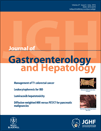
JOURNAL OF GASTROENTEROLOGY AND HEPATOLOGY
Transforming understanding of gastroenterology and hepatology.Welcome to the JOURNAL OF GASTROENTEROLOGY AND HEPATOLOGY, an esteemed publication in the field of gastroenterology and hepatology, proudly published by WILEY. Established in 1986, this journal serves as a crucial platform for researchers, healthcare professionals, and students, presenting groundbreaking research and comprehensive reviews that drive advances in understanding and treating gastrointestinal and liver diseases. With a strong reputation evidenced by its Q1 ranking in gastroenterology and Q2 ranking in hepatology, this journal ranks impressively in the Scopus metrics - positioned at #22 out of 167 in gastroenterology and #21 out of 82 in hepatology, reflecting its contribution to scholarly excellence. Although it does not offer open access options, the journal’s rich archive and diverse topics make it indispensable for those dedicated to improving patient outcomes in these critical areas of medicine. Whether you are a seasoned researcher or an aspiring medical professional, engaging with this journal will keep you at the forefront of the latest developments and emerging trends in gastroenterology and hepatology research.
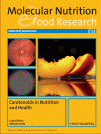
MOLECULAR NUTRITION & FOOD RESEARCH
Exploring the Intersection of Food Science and Human Health.MOLECULAR NUTRITION & FOOD RESEARCH, published by Wiley, is a premier journal dedicated to the rapidly evolving field of food science and nutrition. With an impressive impact factor and a consistent position in the Q1 category for both Biotechnology and Food Science in 2023, this journal stands out as a leading platform for researchers, professionals, and students alike. The scope encompasses a comprehensive range of topics from molecular nutrition to innovative food research, with a focus on translating scientific insights into practical applications that enhance human health. As part of its commitment to accessibility, the journal offers open access options, allowing for wider dissemination and engagement with the academic community. Given its high ranking in Scopus—placing 42nd in Food Science and 62nd in Biotechnology—the journal plays a critical role in advancing knowledge and fostering collaboration in these essential fields. For over two decades, it has provided a vital forum for cutting-edge research, ensuring that each issue contributes significantly to the discourse around food and nutrition.
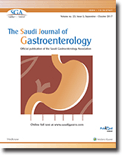
Saudi Journal of Gastroenterology
Advancing the frontiers of gastroenterology research.The Saudi Journal of Gastroenterology is a premier platform dedicated to advancing research and clinical practice in the field of gastroenterology. Published by Wolters Kluwer Medknow Publications, this open-access journal has been serving the academic community since 1995 from its base in India. With an ISSN of 1319-3767 and an E-ISSN of 1998-4049, the journal allows unrestricted access to a wealth of knowledge, fostering an environment where researchers, professionals, and students can engage with cutting-edge studies. As of 2023, it is categorized in the Q3 quartile within gastroenterology, ranking #74 out of 167 in Scopus, which places it within the 55th percentile of its field. The journal aims to disseminate significant findings, clinical trials, and innovative theories that shape the understanding of gastrointestinal disorders and practices. With a commitment to quality and relevance, the Saudi Journal of Gastroenterology is pivotal for anyone seeking to enhance their knowledge and expertise in this vital area of medicine.
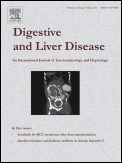
DIGESTIVE AND LIVER DISEASE
Exploring the frontiers of digestive and liver health.DIGESTIVE AND LIVER DISEASE is a prominent journal published by Elsevier Science Inc, dedicated to advancing the field of gastroenterology and hepatology. With an ISSN of 1590-8658 and an E-ISSN of 1878-3562, this journal has established itself as a significant resource within the academic community, especially considering its Q2 ranking in both gastroenterology and hepatology categories as of 2023. Spanning from 2000 to 2024, the journal presents a diverse array of peer-reviewed articles, clinical studies, and review papers that explore the latest advancements and research findings in digestive and liver diseases. The journal's robust impact, reflected in its Scopus rankings—40th out of 167 in gastroenterology and 28th out of 82 in hepatology—highlights its critical role in shaping practices and understanding in these vital areas of medicine. With open access options available, DIGESTIVE AND LIVER DISEASE aims to make high-quality research accessible to a wider audience, thereby encouraging collaboration and innovation. Researchers, healthcare professionals, and students alike will find valuable insights into the complex mechanisms, diagnostics, and therapeutic strategies pertinent to digestive and liver health.

Biochemistry and Cell Biology
Exploring the intricate dance of biochemistry and cellular mechanisms.Biochemistry and Cell Biology, published by Canadian Science Publishing, is a prestigious journal that has been instrumental in advancing the fields of biochemistry, molecular biology, and cell biology since its inception in 1986. With an impressive scope spanning innovative research findings to comprehensive reviews, this journal serves as a vital resource for researchers, professionals, and students alike. Currently positioned in the Q2 quartile in Biochemistry and Q3 quartiles in both Cell Biology and Molecular Biology, it reflects a robust contribution to scientific discourse, placing it among reputable publications in its field. The journal boasts notable rankings within the Scopus database, highlighting its impact and relevance, and continues to be a valuable platform for disseminating pivotal research. By providing access to a wide array of articles, the journal remains committed to fostering knowledge and collaboration in the scientific community.